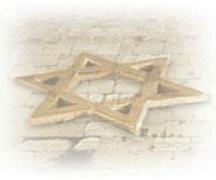Note: The following information is contained in the Wikipedia website. This is not an exact copy of all the information found on the Wikipedia website, nor do we take responsibility for updating this information. For the complete and current information contained in the Wikipedia website, please go onto the Wikipedia website. From Wikipedia, the free encyclopedia
Brit milah (Hebrew : בְרִית מִילָה [bə'r ī t mī'lā] literally: "covenant [of] circumcision"), also berit milah (Sephardi), bris milah (Ashkenazi pronunciation) or bris (Yiddish) is a religious ceremony within Judaism that welcomes infant Jewish boys into a covenant between God and the Children of Israel through ritual circumcision performed by a mohel ("circumciser") in the presence of family and friends, followed by a celebratory meal (seudat mitzvah).
According to the Hebrew Bible, in the Book of Genesis 17:1-14, circumcision was enjoined when God says "Walk before Me and be perfect" to the Biblical patriarch Abraham to be followed by his descendants as "a token of the covenant" concluded with him by God for all generations. It is also when his name is changed from "Abram" to "Abraham" by God:
'Abram was 99 years old. God appeared to him and said, 'I am God Almighty. Walk before Me and be perfect. I will make a covenant between Me and you, and I will increase your numbers very much.' Abram fell on his face. God spoke to him [again], saying, 'As far as I am concerned, here is My covenant with you: You shall be the father of a horde of nations. No longer shall you be called Abram. Your name shall become Abraham, for I have set you up as the father of a horde of nations. I will increase your numbers very, very much, and I will make you into nations — kings will be your descendants. I will sustain My covenant between Me and between you and your descendants after you throughout their generations, an eternal covenant; I will be a God to you and to your offspring after you. To you and your offspring I will give the land where you are now living as a foreigner. The whole land of Canaan shall be [your] eternal heritage, and I will be a God to [your descendants].' God [then] said to Abraham, 'As far as you are concerned, you must keep My covenant — you and your offspring throughout their generations. This is My covenant between Me, and between you and your offspring that you must keep: You must circumcise every male. You shall be circumcised through the flesh of your foreskin. This shall be the mark of the covenant between Me and you. 'Throughout all generations, every male shall be circumcised when he is eight days old. [This shall include] those born in your house, as well as [slaves] bought with cash from an outsider, who is not your descendant. [All slaves,] both houseborn and purchased with your money must be circumcised. This shall be My covenant in your flesh, an eternal covenant. The uncircumcised male whose foreskin has not been circumcised, shall have his soul cut off from his people; he has broken My covenant.' Genesis 17:1-14[1]
As well as in Leviticus 12:3:
On the eighth day, [the child's] foreskin shall be circumcised. [2]
The penalty of non-observance is karet, "excision" from the people as noted in Genesis 17:14. Conversion to Judaism for non-Israelites in Biblical times necessitated circumcision otherwise one could not partake in the Passover offering (Exodus 12:48 ). Today, as in the time of Abraham, it is required of converts in Orthodox and Conservative Judaism. (Genesis 34:14-16).
History
According to Jewish tradition, the original form of circumcision practiced by Jews has traditionally existed since the time of Abraham.
Reason
As stated in the above : "God [then] said to Abraham, 'As far as you are concerned, you must keep My covenant - you and your offspring throughout their generations. This is My covenant between Me, and between you and your offspring that you must keep: You must circumcise every male. You shall be circumcised through the flesh of your foreskin. This shall be the mark of the covenant between Me and you. 'Throughout all generations, every male shall be circumcised when he is eight days old. [This shall include] those born in your house, as well as [slaves] bought with cash from an outsider, who is not your descendant. [All slaves,] both houseborn and purchased with your money must be circumcised. This shall be My covenant in your flesh, an eternal covenant. The uncircumcised male whose foreskin has not been circumcised, shall have his soul cut off from his people; he has broken My covenant."
Kvatter
The name of Kvatter among Ashkenazi Jews is for the person who carries the baby from the mother to the father, who in turn carries him to the mohel. This honor is usually given to a couple without children, as a merit or charm that they should have children of their own. The origins of the term may simply be a corruption of "Gevatter", a German word for godfather[3], but it is also said to be a Yiddish erroneous combination of the words "Kavod" ("honor" in Hebrew) and "Tier" ("door" in Yiddish), meaning "The person honored by bringing the baby". Another Meaning is a mix of Hebrew and Yiddish. Kvatter means like the father. The traditional custom is to honor as the Kvatter a young newly-wed couple (without children of their own yet) as a merit for having a baby. The young woman (Kvatterin) carries the baby from the mother and then hands him over to her husband.
Conversion and exceptions
A Brit milah could be circumvented with Dam Brit, or foregone altogether with a Milah L'Shem Giur:
Medical considerations
If a boy is born prematurely or has some other serious medical condition the Brit is generally postponed. The brit may only take place when a doctor or the parents deem the child healthy enough.
Additionally, the Talmud explicitly notes that a male child is relieved of his responsibility to undergo circumcision if he has had three older brothers die due to complications from the procedure. This is mentioned specifically in the context of some sacrifices in which a priest was prohibited from participating if he was uncircumcised for this reason.
Hatafat dam brit
Medical circumcision alone, in the absence of the brit milah ceremony, does not fulfill the requirements of the mitzvah. In the case of a Jew who was circumcised outside of a brit milah, or an already-circumcised convert, the mohel draws a symbolic drop of blood from the penis.
Hatafat dam brit (heb. דם ברית "Drop of the blood [of the] Covenant") refers to the fulfillment of the mitzvah of a brit milah.
Blood
A brit milah is not considered complete unless blood is actually drawn. This is not the intentional spilling of blood. The standard medical methods of circumcision through constriction do not meet the requirements of the halakhah for brit milah, because they cause hemostasis, i.e., they stop the flow of blood. A brit milah, to be conducted properly, requires the use of a specialized surgical knife, called an izmel, which does allow for dam brit.
Unlike the traditional Jewish method, when circumcision is performed by a urologist or other surgeon, the foreskin is removed by constriction, either with the use of clamps or a synthetic ring. This non-Jewish method works by crushing the skin until it is severed. The nerve endings and the blood vessels are severed in the same manner, causing pain and hemostasis.
Role in conversion
There are reasons not to perform a circumcision when a man has converted to Judaism. A circumcision is not possible if a convert was already circumcised prior to conversion, or if he has a medical condition (such as hemophilia) which would cause a circumcision to potentially endanger his life. In these situations, a brit milah cannot be performed, and instead a single drop of blood is extracted, in a practice called hatafat dam brit (Heb. הטפת דם ברית ).
Milah l'shem giur
A Milah L'shem giur is a "Circumcision for the purpose of conversion". In Orthodox Judaism, this procedure is done by adoptive parents for adopted children who are being converted as part of the adoption.
The laws of conversion and conversion-related circumcision in Orthodox Judaism have numerous complications, and authorities recommend that a rabbi be consulted well in advance.
Social context
According to the Hebrew Bible, it was "a reproach" for an Israelite to be uncircumcised (Joshua 5:9.) The name arelim ("uncircumcised" [plural]) is used opprobriously, denoting the Philistines and other non-Israelites (I Samuel 14:6, 31:4; II Samuel 1:20 ) and used synonymously with tameh (unclean) for heathen (Isaiah 52:1). The word arel ("uncircumcised" [singular]) is also employed for "unclean" (Leviticus 26:41, "their uncircumcised hearts"; compare Jeremiah 9:25 ; Ezekiel 44:7,9); it is even applied to the first three years' fruit of a tree, which is forbidden (Leviticus 19:23 ).
However, the Israelites born in the wilderness after the Exodus from Egypt were not circumcised. Joshua 5:2-9, explains, "all the people that came out" of Egypt were circumcised, but those "born in the wilderness" were not. Therefore Joshua, before the celebration of the Passover, had them circumcised at Gilgal specifically before they entered Canaan . Abraham, too, was circumcised when he moved into Canaan . The opinion ascribed to Joshua contradicts the fact that in Exodus 4:26 , Moses and his wife did not know about circumcision.
Deuteronomy 10:16 says: "Circumcise the foreskin of your heart," suggesting that ethical acts (among people) are as important as spiritual acts (between people and God). The prophetic tradition emphasizes that God expects people to be good as well as pious, and that non-Jews will be judged based on their ethical behavior. Thus, Jeremiah 9:25-26 says that circumcised and uncircumcised will be punished alike by the Lord; for "all the nations are uncircumcised, and all the house of Israel are uncircumcised in heart."
References
- Cp. Shabtai, David and Raymond Sultan Medical Risk Taking in Halacha in 'Journal of Halacha and Contemporary Society, 2006. See also the rabbinic principle, The Lord protects the simple.
- Sdei Chemed vol.8 page 238
- Gesundheit, B.; et al. (August 2004). " Neonatal Genital Herpes Simplex Virus Type 1 Infection After Jewish Ritual Circumcision: Modern Medicine and Religious Tradition" (PDF). Pediatrics114 (2): e259–e263. ISSN 1098-4275. Retrieved on 2006-06-28.
- Rare Circumcision Ritual Carries Herpes Risk
- Clarke, Suzan (June 21, 2006). State offers new guidelines on oral-suction circumcision . The Journal News. Archived from the original on Unknown. Retrieved on 2006-06-28.
- Nussbaum Cohen, Debra (September 23, 2005). City: Brit Case To Bet Din . The Jewish Week. Retrieved on 2006-11-23.
- Nussbaum Cohen, Debra. " Controversy rages in New York over circumcision practice ", The Jewish Ledger, February 23, 2006. Retrieved on 2006-11-23.
- Circumcision Protocol Regarding the Prevention of Neonatal Herpes Transmission . Department of Health, New York State (November (revised) 2006). Retrieved on 2006-11-23.
- Novello, Antonia C. (May 8, 2006). Dear Rabbi Letter . Department of Health, New York State. Retrieved on 2006-11-23. “The meetings have been extremely helpful to me in understanding the importance of metzizah b'peh to the continuity of Jewish ritual practice, how the procedure is performed, and how we might allow the practice of metzizah b'peh to continue while still meeting the Department of Health's responsibility to protect the public health. I want to reiterate that the welfare of the children of your community is our common goal and that it is not our intent to prohibit metzizah b'peh after circumcision, rather our intent is to suggest measures that would reduce the risk of harm, if there is any, for future circumcisions where metzizah b'peh is the customary procedure and the possibility of an infected mohel may not be ruled out. I know that successful solutions can and will be based on our mutual trust and cooperation.”
- Rubin LG, Lanzkowsky P. Cutaneous neonatal herpes simplex infection associated with ritual circumcision. Pediatric Infectious Diseases Journal. 2000. 19(3) 266-267.
- Distel R, Hofer V, Bogger-Goren S, Shalit I, Garty BZ. Primary genital herpes simplex infection associated with Jewish ritual circumcision. Israel Medical Association Journal. 2003 Dec;5(12):893-4
- Gesundheit B, Grisaru-Soen G, Greenberg D, Levtzion-Korach O, Malkin D, Petric M, Koren G, Tendler MD, Ben-Zeev B, Vardi A, Dagan R, Engelhard D. Neonatal genital herpes simplex virus type 1 infection after Jewish ritual circumcision: modern medicine and religious tradition. 2004. Pediatrics. 114(2):259-63
- Metzitza Be'Peh - Halachic Clarification Regarding Metzitza Be'Peh, RCA Clarifies Halachic Background to Statement of March 1, 2005
- The book was originally published in German, Die Ausübung der Mezizo, Frankfurt a.M. 1906; It was subsequently translated into Hebrew, reprinted in Jerusalem in 1966 under the title "Mitzvas Hametzitzah" and appended to the back of Dvar Sinai, a book written by the author's grandson, Sinai Adler.
- Rabbi Paysach J. Krohn, Bris Milah Mesorah Publications Ltd, 1985, pp.103-105
- Rabbi Avram Israel Reisner, On the conversion of adoptive and patrilineal children, Rabbinical Assembly Committee on Jewish Law and Standards, 1988
- Mereches Hameztiztah from the Sdei Chemed
- Vadim Cherny, How Judaic is circumcision?, 2005








